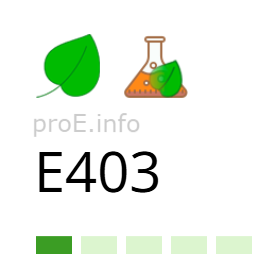
Other names for the additive (synonyms)
General Information
Ammonium alginate (food additive E403) is a salt of alginic acid in which calcium or sodium ions are replaced by ammonium ions.
In the food industry, additive E403 is used as a stabilizer, thickener, and emulsifier. Its main role is regulating product consistency and providing the necessary viscosity.
In nature, ammonium alginate does not occur in pure form, however its precursor — alginic acid — is found in the cell walls of brown seaweeds (laminaria, fucus, macrocystis). In industry, to obtain additive E403, alginic acid is extracted from marine algae and then neutralized with ammonium salts.
From a chemical point of view, ammonium alginate is a polysaccharide complex consisting of residues of D-mannuronic and L-guluronic acids in the form of ammonium salts. Its general formula can be described as (C6H7O6NH4)n.
In appearance, additive E403 is a powder ranging from white to cream color, highly soluble in water. Solutions of ammonium alginate are viscous, form gels, and easily retain moisture.
The production of additive E403 today is carried out mainly in Japan, China, France, and the USA. Additional facilities exist in Chile, Norway, and India. The production technology includes alkaline extraction of alginic acid from seaweeds, purification, and subsequent interaction with ammonium compounds.
Effects on the Body
Benefits of Additive E403
By its mechanism of action on the human body, ammonium alginate is close to other salts of alginic acid (sodium alginate (E401), potassium alginate (E402), and calcium alginate (E404)). Additive E403 acts as an enterosorbent — it binds heavy metals (mercury, lead, cadmium) and radionuclides, reducing their toxicity and accelerating elimination from the body. Studies show that alginates can reduce the accumulation of radioactive isotopes in tissues.
There is also evidence of the hypolipidemic effect of alginates. In experiments on animals and humans they contributed to lowering cholesterol and triglyceride levels, as well as normalizing lipid metabolism. This makes the additive promising for cardiovascular disease prevention and in combating overweight.
Due to their ability to form gels in the intestine, alginates can slow down the absorption of carbohydrates and fats, helping to control blood sugar levels. In clinical studies, a reduction in glycemic load was reported in patients with type 2 diabetes when alginates were included in the diet.
In addition, ammonium alginate solutions are used in pharmacology as excipients for drug delivery. They can prolong the release of active components and reduce irritating effects on mucous membranes.
Risks of Additive E403
Overall, ammonium alginate is considered a low-toxicity compound. In animal studies, it was shown that even at very high doses (grams per kilogram of body weight), side effects were limited to mild changes in liver enzymes (AST, ALT), which remained within normal limits.
For humans, excessive intake of alginates may lead to a laxative effect and impaired absorption of certain minerals, especially calcium and iron. However, such effects are rare and associated with multiple exceeding of permissible doses.
Unlike other alginates, ammonium alginate can release ammonia when heated or in an acidic environment, which irritates mucous membranes and the respiratory tract. Partly because of this drawback, additive E403 is used in the food industry much less often than sodium alginate.
According to JECFA (FAO/WHO), an acceptable daily intake (ADI) of 50 mg/kg body weight has been established for alginates. EFSA in its 2017 evaluation noted that a numerical ADI is unnecessary, since at levels of actual use the additive is safe.
However, in young children, excessive intake of alginates may lead to impaired mineral metabolism. EFSA recommended limiting the concentration of the additive in specialized infant formulas.
Uses
Additive E403 is used in the food industry as a thickener, stabilizer, and gelling agent. It is applied in the production of:
- dairy products (yogurts, desserts, ice cream);
- confectionery (marmalade, jelly, jams, candies);
- sauces, mayonnaise, and dressings;
- soft drinks to provide cloudiness and stabilize suspensions;
- food concentrates and ready-made meals.
In medicine and pharmacology, ammonium alginate is used as a component in capsules and tablets where it regulates the release rate of active substances. In cosmetics, it is used to stabilize creams, gels, and lotions.
Thanks to its ability to form films and gels, additive E403 is also used in biotechnology and microbiology as a matrix for cell immobilization.
Legal Status
In the European Union, additive E403 is approved for use under Regulation (EC) No 1333/2008. In 2017, EFSA re-evaluated alginic acid and its salts (E400–E404) and confirmed their safety.
In the United States, the Food and Drug Administration (FDA) classifies ammonium alginate as GRAS (Generally Recognized As Safe). In Canada, Japan, Australia, and most countries worldwide, the additive is also permitted for use in the food industry.
JECFA has established an acceptable daily intake (ADI) of 50 mg/kg body weight, confirming the low toxicity of the compound. In Ukraine and CIS countries, additive E403 is included in the list of approved food additives.